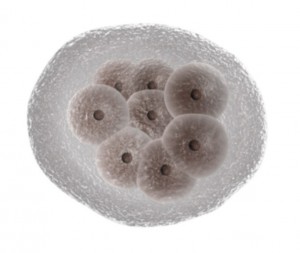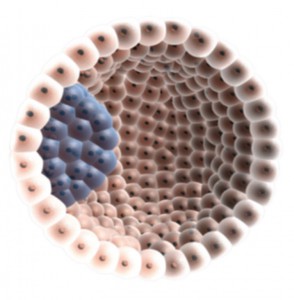Genetic examination
PREIMPLANTATION GENETIC DIAGNOSIS (PHD) AND PREIMPLANTATION GENETIC SCREENING (PGS)
PGD/PGS – preimplantation genetic diagnosis (in case of risk for transmission of previously detected genetic disease onto the offspring) and preimplantation genetic screening (without previously detected genetic anomaly in parents) are methods enabling genetic assessment of embryos prior to their implantation in the uterus within IVF cycle.
Many IVF cycles can result in the disappointment of a treated couple as the embryo implantation in the woman’s uterus has failed. One of the possible causes for this failure may be improper amount of genetic material (i.e. improper number of chromosomes) having been transferred into the woman’s uterus. A condition called aneuploidy results from the presence of an extra or, vice versa, missing chromosome in embryo. While some types of aneuploids may result in birth of a baby with Down syndrome (caused by a chromosomal disorder with an extra chromosome 21), or with Edwards syndrome (caused by a chromosomal disorder with an extra chromosome 18), most pregnancies that result from aneuploid embryos are spontaneously aborted. Only an embryo with the normal number of chromosomes has a chance of implanting, carrying to term and resulting in birth of a healthy child.
Advanced maternal age significantly contributes to higher risk for producing aneuploid eggs and thus resulting in a dramatic decline in fertility in women at their late 40s.
Chromosome screening can be performed from one single cell (blastomere) removed from the embryo during culturing on day 3 or from 3-5 cells obtained on day 5 from the embryo at the blastocyst stage. The analysis involves scanning of thousands of DNA sequences that are unique for each human chromosome. The procedure of removing cells from an embryo or egg is called biopsy. The results of testing are always available prior to the embryo transfer to the woman’s uterus.


Pic. 2 Embryo day 5 (blastocyst)
The purpose of chromosome screening is to achieve birth of a healthy child in the shortest possible timeframe through the safest treatment.
- To reduce the rate of miscarriages
- To reduce the risk of pregnancy complications
- To shorten treatment duration and reduce financial costs associated with birth of a healthy child through minimizing the number of repeated cycles
- To reduce the rate of multiple pregnancies due to transferring of screened embryos having the greatest chance to result in birth of a healthy child
- To provide a patient with a relevant diagnostic information on the basis of which they can decide on a further IVF cycle or to ask for egg donation
Preimplantation screening is suitable for couples meeting the following indications:
- Advanced age of a woman or man
- Recurrent miscarriages
- Repeated failed embryo transfers in previous IVF cycles
- Birth or miscarriage of the foetus with a developmental defect (chromosomal abnormality)
- Poor parameters of the partner’s semen analysis (high percentage of pathological forms of sperm)
- Chromosomal abnormalities detected in the couple
- Conditions after treatment of oncological diseases using chemotherapy or radiation and other





